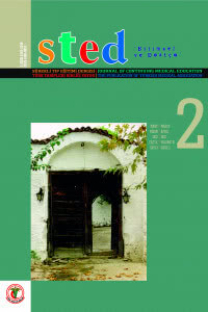Hemşirelik Öğrencilerinin Klinik Eğitiminde Kullanılan Yansıtıcı Düşünme Tekniğine Yönelik Görüşlerinin İncelenmesi
An Investigation into the Opinions of Nursing Students on Reflective Thinking Technique Used in Their Clinical Education
___
- Nicholl H, Higgins A. Reflection in preregistration nursing curricula. Journal of Advanced Nursing 2004; 46(6): 578-585.
- Pearson DJ, Heywood P. Portfolio use in general practice vocational training: a survey of GP registrars. Medical education 2004; 38(1): 87-95.
- Landeen J, Byrne C, Brown B. Exploring the lived experiences of psychiatric nursing students through self‐reflective journals. Journal of Advanced Nursing 1995; 21(5):878-885.
- Bulman C, Schutz S. Reflective Practice in Nursing. 4nd ed. USA: Blackwell Publishing Ltd.; 2008.
- Kennison MM. The evaluation of students' reflective writing for evidence of critical thinking. Nursing Education Perspectives 2006; 27(5): 269- 273.
- Burrows DE. The nurse teacher's role in the promotion of reflective practice. Nurse Education Today 1995; 15(5): 346-350.
- Silvia B, Valerio D, Lorenza G. The reflective journal: A tool for enhancing experience-based learning in nursing students in clinical practice. Journal of Nursing Education and Practice 2012; 3(3): 102-111.
- McCarthy B, Murphy S. Assessing undergraduate nursing students in clinical practice: do preceptors use assessment strategies?. Nurse Education Today 2008; 28(3): 301-313.
- Chong MC. Is reflective practice a useful task for student nurses? Asian Nursing Research 2009; 3(3): 111-120.
- Tanrıkulu F, Erol F, Dikmen Y. Hemşirelik öğrencilerinde klinik uygulamalarda kullanılan reflekşın yönteminin problem çözme becerisine etkisi. Journal of Human Sciences 2016; 13(3): 4931-4943.
- Durdukoca ŞF, Demir M. İlköğretim öğretmenlerin bazı değişkenlere göre yansıtıcı düşünme düzeyleri ve düşüncelerindeki öğretmen niteliklerinin yansıtıcı öğretmen niteliklerine uygunluğu. Mustafa Kemal Üniversitesi Sosyal Bilimler Enstitüsü Dergisi 2012; 9(20):357-374.
- Gustafsson C, Fagerberg I. Reflection, the way to professional development? J Clin Nurs 2004; 13(3): 271-280.
- Kumcağız H, Koyuncu S, Yılmaz A, Uzun A, Güneştaş İ. Samsun Sağlık Yüksekokulu Hemşirelik Bölümü öğrencilerinin kuramsal ve uygulamalı eğitimde yaşadıkları sorunların belirlenmesi. Journal of Experimental and Clinical Medicine 2009; 22(2): 71-77.
- Aydın MF, Argun MŞ. Bitlis Eren Üniversitesi Sağlık Yüksekokulu Hemşirelik Bölümü Öğrencilerinin hastane uygulamalarından beklentileri vekarşılaştıkları sorunlar. Acıbadem Üniversitesi Sağlık Bilimleri Dergisi 2010; 1(4): 209-213.
- Karaöz S. Hemşirelik eğitiminde klinik değerlendirmeye genel bakış: Güçlükler ve öneriler. Dokuz Eylül Üniversitesi Hemşirelik Fakültesi Elektronik Dergisi 2013; 6(3):149-158.
- Karaöz S. Hemşirelikte klinik öğretime genel bir bakış ve etkin klinik öğretim için öneriler. Hemşirelikte Araştırma ve Geliştirme Dergisi 2003; 5(1): 5-21.
- Forneris SG, McAlpine CP. Evaluation of a reflective learning intervention to improve critical thinking in novice nurses. Journal of Advanced Nursing 2007; 57(4): 410- 421.
- Teekman B. Exploring reflective thinking in nursing practice. Journal of Advanced Nursing 2000; 31(5): 1125-1135.
- Mann K, Gordon J, MacLeod A. Reflection and reflective practice in health professions education: a systematic review. Advances in Health Sciences Education 2009; 14(4):595-621.
- Tok Ş. Fen bilgisi dersinde yansıtıcı düşünme etkinliklerinin öğrencilerin akademik başarılarına ve fen bilgisi dersine yönelik tutumlarına etkisi. İlköğretim Online 2008; 7(3): 557-568.
- Hasırcı ÖK, Sadık F. Sınıf öğretmenlerinin yansıtıcı düşünme eğilimlerinin incelenmesi. Çukurova Üniversitesi Sosyal Bilimler Enstitüsü Dergisi 2011; 20(2):195-210.
- Norton JL. Creative Thinking and Locus of Control as Predictors of Reflective Thinking in Preservice Teachers 1994; 1-36.
- Duban N, Yelken TY. Öğretmen adaylarının yansıtıcı düşünme eğilimleri ve yansıtıcı öğretmen özellikleriyle ilgili görüşleri. Çukurova Üniversitesi Sosyal Bilimler Enstitüsü Dergisi 2010; 19(2):343- 360.
- Mert H, Bilik Ö, Sarı YH. Üstün B. Bir öğrenme deneyimi: Reflekşın (Reflection), DEU HYO ED 2011; 4(2): 89-93.
- Rodgers C. Defining Reflection: Another look at John Dewey and reflective thinking. Teachers College Record 2002; 104(4):842-866.
- Bapoğlu SS, Açıkgöz F, Kapısız Ö, Yılmaz Ö. Hemşirelik öğrencilerinin eleştirel düşünme becerilerini geliştirmede drama yönteminin kullanılması. Düzce Üniversitesi Sağlık Bilimleri Enstitüsü Dergisi 2011; 1(3): 17-21.
- Akça NK, Taşçı S. Hemşirelik eğitimi ve eleştirel düşünme. Mersin Üniversitesi Eğitim Fakültesi Dergisi 2009; 5(2):187-196.
- ISSN: 1300-0853
- Yayın Aralığı: Yılda 6 Sayı
- Başlangıç: 1992
- Yayıncı: TÜRK TABİPLERİ BİRLİĞİ
AYNUR KIZILIRMAK, SEMRA KOCAÖZ
Üniversite Öğrencilerinde Cinsiyete Göre Cinsel Mitler
ÖZLEM KARABULUTLU, Derya YILMAZ
Cansu KÖSE, Yunus GÜNEGÜL, Ceren ERDEM, Gökçe UYURCA, Beste Ekin SANDALCI, Anıl ALP, Mustafa KONAKÇI
Fatma TANRIKULU, Funda EROL, Nasibe Yağmur FİLİZ, Handenur GÜNDOĞDU, Yurdanur DİKMEN
Sağlık Çalışanlarının Doğum Şekli Tercihleri ve Etkileyen Faktörler
Bariatrik Cerrahi ve Perioperatif Hemşirelik Bakımı
AYLİN GÜÇLÜ, PINAR TUNÇ TUNA, ŞERİFE KURŞUN
Sağlık Hizmetleri Meslek Yüksekokulunda Okuyan Öğrencilerin Ölüm Kaygısı Düzeyleri
BURCU GENÇ KÖSE, MEHTAP METİN KARAASLAN, YAĞMUR AKBAL
Seher YÜCEL, Sümeyye AKYÜZ, Mehmet PARLAK, Hüseyin GÜDÜCÜOĞLU
Lokalize Laringeal Amiloidoz: Nadir Bir Olgu Sunumu
Levent RENDA, Ömer Tarık SELÇUK, İrem HİCRAN ÖZBUDAK, Hülya EYİGÖR
